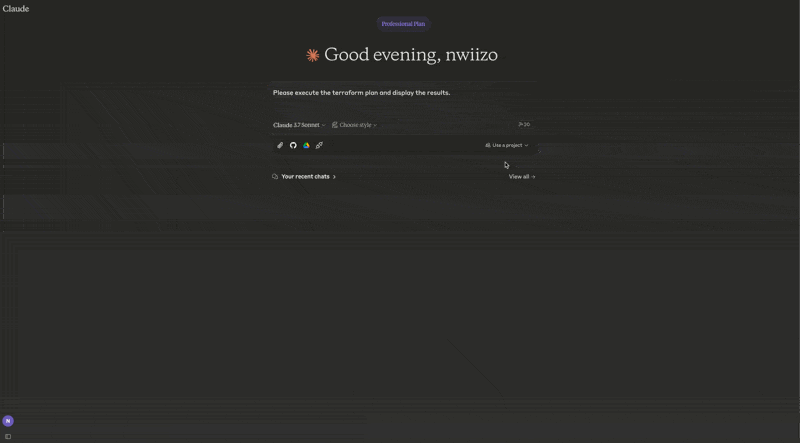Tfmcp: Terraform 模型上下文协议工具
🌍 Terraform 模型上下文协议 (MCP) 工具 - 一款实验性的命令行工具,使 AI 助手能够管理和操作 Terraform 环境。支持读取 Terraform 配置、分析计划、应用配置以及通过 Claude Desktop 集成管理状态。⚡️
概览
什么是 tfmcp?
Terraform 模型上下文协议 (MCP) 工具,通常称为 ### tfmcp,是一个实验性的命令行界面 (CLI) 工具,旨在增强 Terraform 环境的管理和操作。它允许用户读取 Terraform 配置、分析计划、应用配置和管理状态,同时与 AI 助手(如 Claude Desktop)无缝集成。
tfmcp 的特点
- AI 集成:tfmcp 支持与 AI 助手的集成,使 Terraform 环境的管理更加智能。
- 配置管理:用户可以通过 CLI 直接读取和管理 Terraform 配置。
- 计划分析:该工具提供分析 Terraform 计划的能力,帮助用户在应用更改之前理解其影响。
- 状态管理:tfmcp 允许高效管理 Terraform 状态,确保用户能够有效跟踪基础设施的更改。
- 用户友好的界面:CLI 设计直观,使新手和经验丰富的用户都能轻松使用。
如何使用 tfmcp
- 安装:首先从 crates.io 安装 tfmcp。
- 配置:设置您的 Terraform 环境,并确保您的配置准备好进行分析。
- 命令执行:使用 CLI 命令读取配置、分析计划和应用更改。例如:
- 读取配置:
tfmcp read <configuration_file> - 分析计划:
tfmcp analyze <plan_file> - 应用配置:
tfmcp apply <configuration_file>
- 读取配置:
- 状态管理:有效利用 tfmcp 管理您的 Terraform 状态,确保基础设施保持一致。
常见问题解答
tfmcp 的目的是什么?
tfmcp 旨在通过提供配置读取、计划分析和状态管理的工具来促进 Terraform 环境的管理,同时与 AI 助手集成。
tfmcp 适合初学者吗?
是的,tfmcp 用户友好,旨在让所有经验水平的用户都能轻松使用,包括 Terraform 新手。
tfmcp 可以与其他工具集成吗?
是的,tfmcp 旨在与 AI 助手协同工作,并可以集成到各种工作流程中,以增强 Terraform 管理。
我在哪里可以找到有关 tfmcp 的更多信息?
有关更多详细信息,您可以访问 tfmcp 的 GitHub 仓库 或查看其 文档。
详情
Server配置
{
"mcpServers": {
"tfmcp": {
"command": "docker",
"args": [
"run",
"-i",
"--rm",
"ghcr.io/metorial/mcp-container--nwiizo--tfmcp--tfmcp",
"./bin/tfmcp --dir terraform-dir --path path"
],
"env": {
"TERRAFORM_DIR": "terraform-dir",
"TFMCP_LOG_LEVEL": "tfmcp-log-level",
"TFMCP_DEMO_MODE": "tfmcp-demo-mode"
}
}
}
}